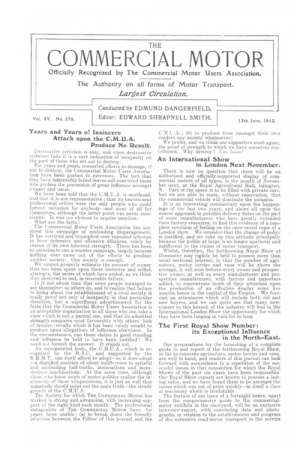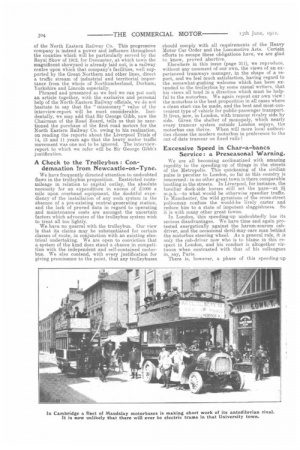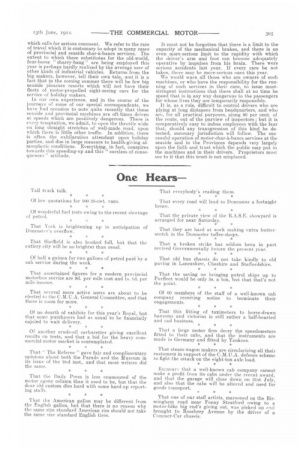Years and Years ol Insincere Attack upon the C.M.U.A.
Page 1

Page 2

Page 3

If you've noticed an error in this article please click here to report it so we can fix it.
Produce No Result.
pestitictive criticism is easy, and when destructive criticism tails it is a sure indication of incapacity on the part of those who set out to destroy. For years and years, concerted efforts to damage, if not to destroy, the Commercial Motor Users Association have been pushed to extremes. The fact that they have lamentably failed leaves self-convicted those who profess the possession of great influence amongst owners and users.
We have been told that the C.M,U.A. is moribund, and that it is not representative ; that its heaven-sent professional critics were the only people who could furnish salvation for anybody—and most of all for themselves, although the latter point was never mentioned. It was too obvious to require mention. What are the facts'?
The Commercial Motor Users Association has survived this campaign of misleading disparagement.
It has survived and triumphed over repeated schemes to form defensive and offensive alliances, solely by reason of its own inherent strength. There has been no occasion to run a counter campaign, largely because nothing ever came out of the efforts to produce another society. One society is enough.
We cannot properly estimate the amount of money that has been spent upon these insincere and selfish attempts, the series of which have ended, as we think they deserved to end, in miserable failure,
Is it not about time that some people managed to see themselve, as others do, and to realize that failure
to bring about the establishment of a rival society is really proof not only of incapacity in that particular direction, but a superfluous advertisement for the facts that the Commercial Motor Users Association is an acceptable organization to all those who can take a view which is not a partial one, and that its admitted strength compares most favourably with others' lack
of results—results which it has been vainly sought to produce upon allegations of influence elsewhere. In
the circumstances, can these claims to good standing and influence be held to have been justified ? We need not furnish the answer. It stands out.
An incorporated body, the C.M.U,A., which is recognized by the R. A.C. and supported by the S_M.M.T., can itself afford to adopt—as it does adopt —a dignified position of silent indifference to spiteful and misleading half-truths, insinuations and more flevious machinations. At the same time, although those ho know much of motor politics realize the insincerity of these vituperations, it is just as well that somebody should point out the main truth—the steady growth of the C.M.U.A. The Society for which THE COMMERCIAL MOTOR has worked is strong and advancing, with increasing sup
port of the right kind each month. The professional antagonists of THE COMMERCIAL MOTOR have, for years, been unable : (a) to break down the friendly relations between the Editor of this journal and the (b) to produce from amongst their own readers any society whatsoever! We prefer, and we think our supporters must agree, the proof of strength to which we have ourselves contributed. Why destroyl Cam bora)?
An International Show
in London Next November.
There is now no question that there will be an authorized and officially-supported display of commercial motors of all types, in the month of November next, at the Royal Agricultural Hall, Islington, N. Part of the space is to be filled with private cars, but we are able to state, without reservation, that the commercial vehicle will dominate the occasion.
It is an interesting commentary upon the happenings of the last two years, and above all upon the nearer approach to possible delivery dates on the part of some manufacturers who have greatly extended their factory resources, to find this evidence of a complete revulsion of feeling on the once-vexed topic of a London show. We consider that the change of policy is justified, and we take up this attitude principally because the public at large is no longer apathetic and indifferent to the claims of motor transport.. Whilst, therefore, the forthcoming Royal Show at Doncaster may rightly be held to possess more than usual sectional interest, in that the number of _agrimotors, motor lorries and vans will be above the average, it will soon behove every owner and prospec tive owner, as well as every manufacturer importers
prospective manufacturer, with factors and added, to concentrate much of their attention upon the production of an effective display somefive months hence in the capital of the Empire. We forecast an attendance which will include both old and new buyers, and we can quite see that many newcomers to this branch of the industry will find in the International London Show the opportunity for which they have been longing in vain for so long.
The First Royal Show Number: its Exceptional Influence in the North-East.
Our preparations for the furnishing of a complete guide to and report of the forthcoming Royal Show, so far as concerns agrimotors, motor lorries and vans, are well in hand, and readers of this journal can look forward with assuredness to a repetition of the successful issues in that connection for which the Royal Shows of the past six years have been responsible. Our Royal Show reports are known to possess a lasting value, and we have found them to be amongst the issues which run out of print quickly—in itself a class of testimony which is irrefutable. The feature of our issue of a fortnight hence, apart from the comprehensive guide to the commercialmotor exhibits in the showyard, will be an exclusive interview-report, with convincing data and photographs, in relation to the establisinnent and progress of the extensive road-motor transport in the service
of the North Eastern Railway Co. This progressive company is indeed a power and influence throughout the counties which will be particularly served by the Royal Show of 1912, for Doncaster, at which town the magnificent showyard is already laid out, is a railway centre upon which that company's facilities, well supported by the Great Northern and other lines, direct, a traffic stream of industrial and territorial importance from the whole of Northumberland, Durham, Yorkshire and Lincoln especially. Phrased and presented as we feel we can put such an article together, with the exclusive and personal help of the North-Eastern Railway officials, we do not hesitate to say that the " missionary " value of the interview-report will be most considerable. Incidentally, we may add that Sir George Gibb, now the Chairman of the Road Board, tells us that he sanctioned the purchase of the first road motors for the North Eastern Railway Co. owing to his realization, on reading the reports about the Liverpool Trials of 14, 13 and 11 years ago that the heavy motor traffic movement was one not to be ignored. The interviewreport to which we refer will be Sir George Gibb's justification.
A Check to the Trolleybus : Condemnation from Newcastle-on-Tyne.
We have frequently directed attention to undoubted flaws in the trolleybus proposition. Restricted routemileage in relation to capital outlay, the absolute necessity for an expenditure in excess of £1000 a mile upon overhead equipment, the doubtful expediency of the installation of any such system in the absence of a pre-existing central-generating station, and the lack of proved data in regard to operating and maintenance costs are amongst the uncertain factors which advocates of the trolleybus system wish to treat all too lightly.
We have no quarrel with the trolleybus. Our view is that its claims may be substantiated for certain classes of route, in conjunction with an existing electrical undertaking. We are open to conviction that a system of the kind does stand a chance in competition with the independent and sell-contained motorbus. We also contend, with every justification for giving prominence to the point, that any trolleybuses
should comply with all requirements of the Heavy Motor Car Order and the Locomotive Acts. Certain efforts to escape these obligations have, we are glad to know, proved abortive. Elsewhere in this issue (page 311), we reproduce, without any comment of our own, the views of an experienced tramways manager, in the shape of a report, and we feel much satisfaction, having regard to the somewhat-gushing welcome which has been extended to the trolleybus by some casual writers, that his views all tend in a direction which must be helpful to the motorbus. We again repeat our own view : the motorbus is the best proposition in all cases where a clean start can be made, and the best and most-convenient type of vehicle for public-passenger transport. It lives, now, in London, with tramcar rivalry side by side. Given the shelter of monopoly, which nearly every tramcar system outside London enjoys, the motorbus can thrive. When will more local authorities choose the modern motorbus in preference to the out-of-date tramcar on fixed rails?
Excessive Speed in Char-a-bancs Service: a Preseasonal Warning.
We are all becoming acclimatized with amazing rapidity to the speeding-up of things in the streets of the Metropolis. This quickening of the civilian pulse is peculiar to London, so far as this country is concerned : in no other great town is there comparable hustling in the streets. In Liverpool, for instance, the familiar dock-side horses still set the pace—at 2i m.p.h.—to what would be otherwise speedier traffic. In Manchester, the wild gyrations of the cross-street policeman confuse the would-be lively carter and reduce him to a state of impotent sluggishness. So it is with many other great towns.
In London, this speeding-up undoubtedly has its serious disadvantages. We have time and again protested energetically against the harum-scarum cabdriver, and the occasional devil-may-care man behind the motorbus steering wheel. As a general rule, it is only the cab-driver now who is to blame in this respect in London, and his conduct is altogether virtuous when contrasted with that of his colleagues in, say, Paris.
There is, however, a phase of this speeding-up which calls for serious comment. We refer to the rate of travel which it is customary to adopt in many cases of provincial and seaside char-a-banes services. The extent to which these substitutes for the old-world, four-horse " sharry-bang " are being employed this year is perhaps hardly realized by the average user of other kinds of industrial vehicles. Returns from the big makers, however, tell their own tale, and it is a fact that in the coming summer there will be few big seaside pleasure resorts which will not have their fleets of motor-propelled sight-seeing cars for the service of holiday makers. In our own experience, and in the course of the journeys of some of our special correspondents, we have had occasion to note quite recently that these seaside and provincial machines are oft-times driven at speeds which are positively dangerous. There is every temptation, we admit, to open the throttle wide on long straight stretches of well-made road, upon which there is little other traffic. In addition, there is often the exhilaration attendant upon holiday parties, and due in large measure to health-giving atmospheric conditions. Everything, in fact, conspires towards this speeding-up and this " careless-of-consequences " attitude. It must not be forgotten that there is a limit to the capacity of the mechanical brakes, and there is an even more-serious limit to the rapidity with which the driver's arm and foot can become adequately operative by impulses from his brain. There were serious accidents last year. If every care be not taken, there may be more-serious ones this year. We would warn all those who are owners of such machines, or who have the responsibility for the running of such services in their care, to issue moststringent instructions that there shall at no time be speed that is in any way dangerous to the passengers for whose lives they are temporarily responsible. It is, as a rule, difficult to control drivers who are plying at long distances from headquarters, and who are, for all practical purposes, along 90 per cent. of the route, out of the purview of inspectors ; but it is comparatively easy to imbue employees with the fear that, should any transgression of this kind be detected, summary jurisdiction will follow. The successful operation of motor-char-h-banes services at the seaside and in the Provinces depends very largely upon the faith and trust which the public may put in the machines and in their drivers. Proprietors must see to it that this trust is not misplaced.
























